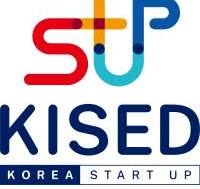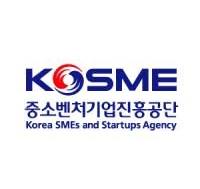Supporting Korean Startups’ market expansion: Spotlight on KOSME and KISED Programs
The journey towards growth has never been an easy ride for entrepreneurs, especially when expanding overseas. That’s why the HEC Paris Innovation & Entrepreneurship Institute, through the Incubation & Acceleration Center, launched the International Program aimed to help international startups succeed in the French market. There are two different offers: a short-term program starting at 2 weeks, and a long-term program lasting a year.
For Korean entrepreneurs, it can all be a different story if they have their eyes set on France and Europe. They can rely on the Korean government through the KOSME, in partnership with STATION F, or KISED programs. To better understand these options, we interviewed Kiwon Lee, International Program Lead at the HEC Paris Innovation & Entrepreneurship Institute, and Charlie Park, who joined the KISED program in 2022 after that joined KOSME program 2023. Let's find out how beneficial both programs are for Korean entrepreneurs.
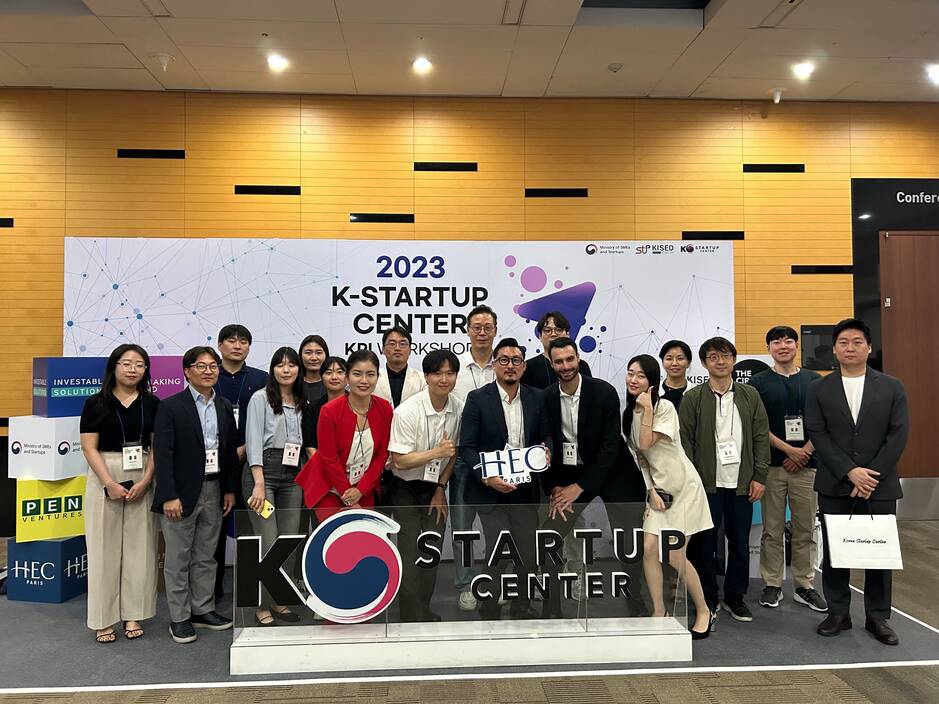
How to successfully make your mark in the French and EU markets
Charlie Park, Founder of Komachine, the leading Asian online platform for the machine industry, joined the both of our Korean programs at HEC Paris. Just like Komachine, startups who join either the KOSME or the KISED program hope to capitalize on support and opportunities for expansion to effectively establish themselves in the market. For Charlie, his main expectation was to “be able to build a strong network with HEC Paris and Business France.” They succeeded with the help of Korean government agencies like KOSME and KISED. Komachine initially joined the KISED Program in 2022 and then joined the KOSME program in 2023.
So far, the program has proved its worth for Komachine: “Our transaction volume in France will hit 1M€ this year and expand to 2~3M€ next year!,” Charlie affirms. Komachine benefited from comprehensive local and external support, including office space in Paris and professional networks, which “are key when operating businesses in France”. According to Charlie, “it will never be easy for a Korean startup to develop a business in France without the help of KOSME and KISED. The barrier of business accessibility and operation is incredibly high in Paris compared to other countries,” he warns.
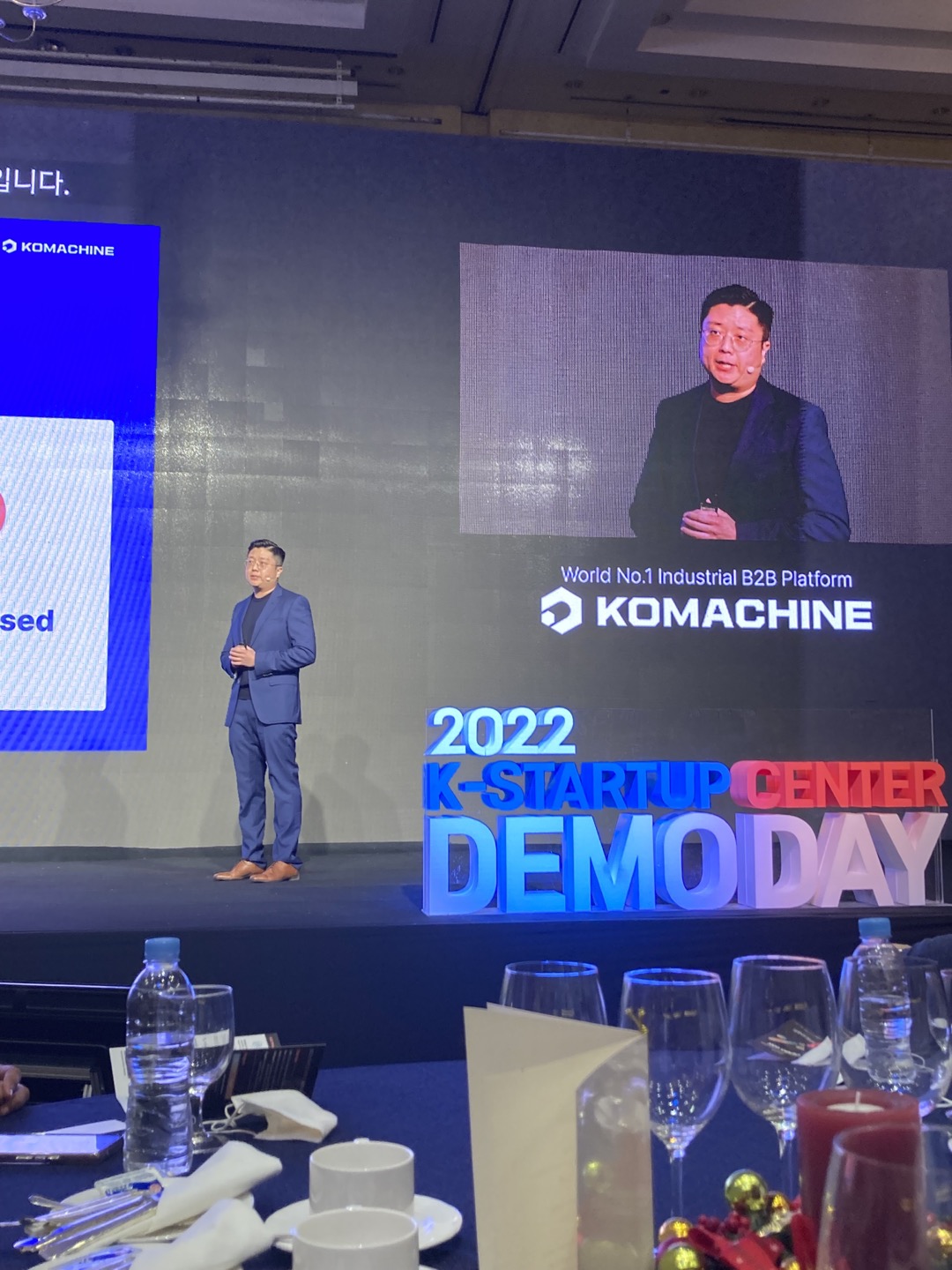
Can my K-startup fit into the French/European market? Give it a try with KISED or KOSME!
Startups with the same expectations as Komachine are numerous in South Korea. In the country, governmental and non-profit organizations have established support programs to nurture and accelerate startups. Among them, two stand out:
- The KOSME (Korea SMEs and Startups Agency) Program, which mainly targets innovative technologies such as Tech, AI, XR, agricultural technology, food technology but also on K-Contents, which are experiencing a growing popularity in Europe.
- The KISED (Korea Institute of Startup & Entrepreneurship Development) Program, which focuses on two specific sectors: smart cities and culture-related content.
For HEC Paris, It all started in 2020 when Incubateur HEC Paris became a partner of KISED. Since then, both have been operating the Korea Startup Center (KSC) program to support Korean startups wishing to enter the French and European markets. Initiated by the Ministry of SMEs and Startups (MSS), the K-Startup Center is the common thread between both KISED and KOSME.
In 2022, both Incubator HEC Paris and Station F—the world's largest startup campus in Paris–became a partner of KOSME, a non-profit, government-funded organization that supports SMEs and startups with financial and non-financial assistance. Since then, 10 startups have joined the K-Startup Center Program through the KOSME program every year.
Two programs, one successful recipe
What really lies behind these two programs? Kiwon Lee explains: “KISED and KOSME provide resources and office space in Paris through the KSC program, facilitating the scale-up of Korean startups in France and in Europe”. More specifically, the KOSME program, which runs for more than one year, aims to support market expansion for Korean startups by providing PR, marketing activities, and facilitating sales growth. KISED, which lasts for 3 months (1 month online and two months on site at Station F) focuses on fulfilling startups' fundamental requirements: product development, market penetration, talent acquisition, securing funding, and fostering sustained growth and success.
No matter the program, supported Korean startups benefit from the Incubateur HEC Paris ecosystem, expert meetings and consultations, access to investors and customers, business introductions, networking events held at Station F, and collaboration with international organizations.
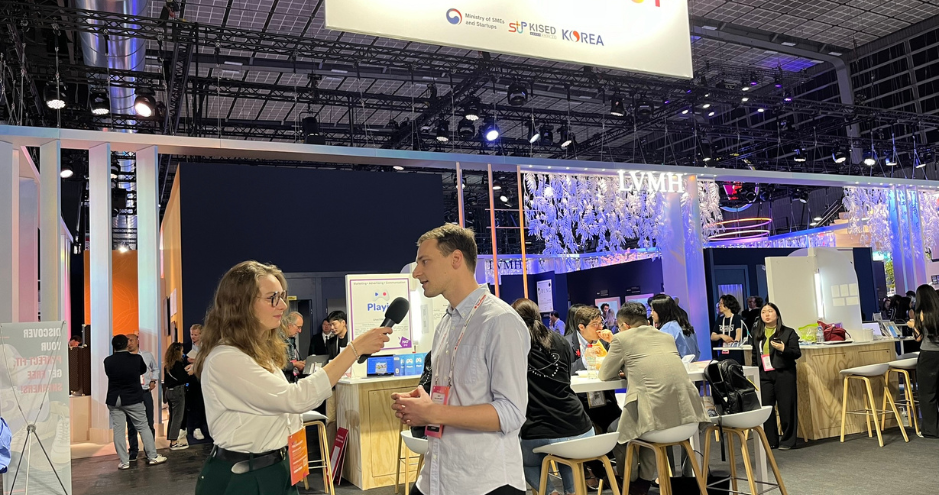
A track record of success
Looking back at these last three years, Kiwon affirms that “both programs have achieved remarkable results in supporting Korean startups, whether it is to achieve partnerships with local companies strategically or to obtain the French Tech visa”. In 2024, Incubateur HEC Paris was selected again to operate the KSC program for both KISED and KOSME.
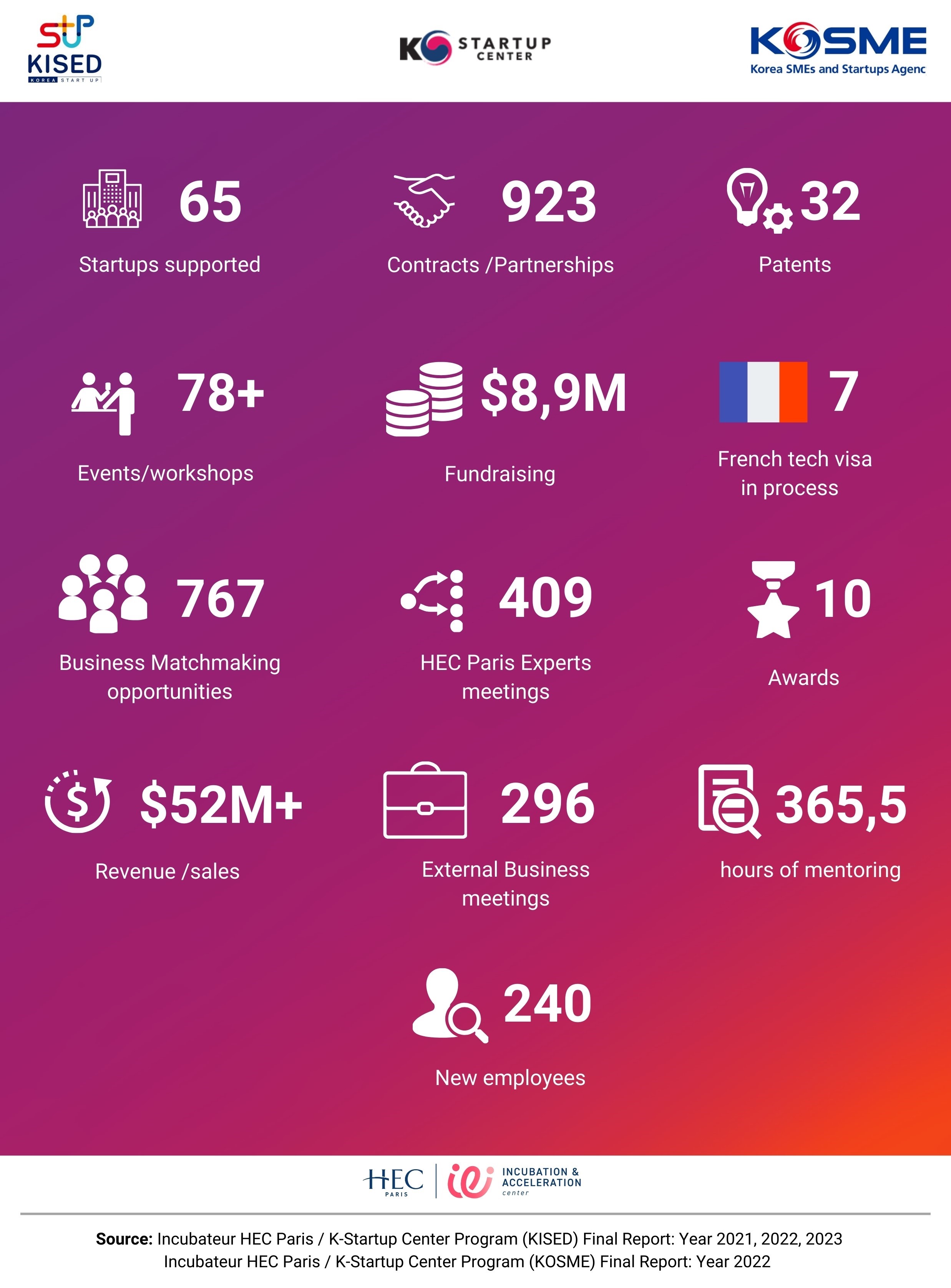
Kiwon Lee, the driving force behind the program
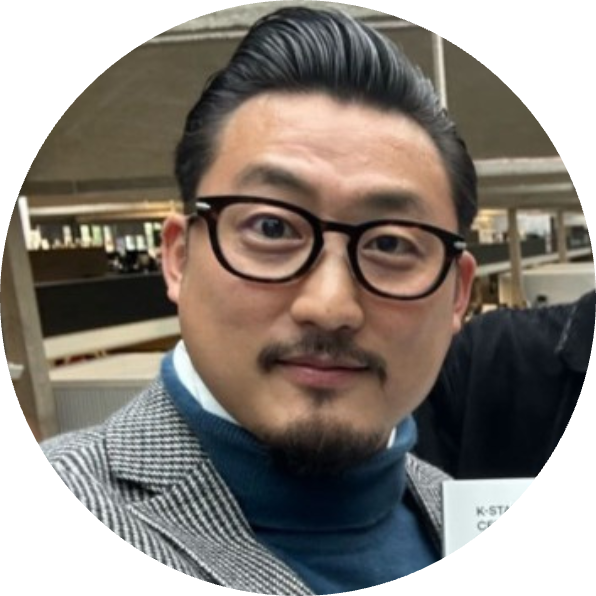
Having worked in South Korea, then in Switzerland with the Olympic Committee and later on tech projects to find solutions to add new technologies to sports, Kiwon is currently managing Incubation and Acceleration Programs at HEC Paris. We couldn’t help but ask about the biggest cultural difference he has witnessed working with both French and Korean entrepreneurs. “The French are definitely more easy going. You can easily have an informal chat with them, whereas Koreans are more polite and introverted. This reflects in their modus operandi: which can sometimes result in less proactive engagement. To address this, we actively encourage participants to engage more with others and expand their professional networks, fostering a more dynamic and interactive environment.”
Interested in joining KISED or KOSME? Here is a piece of advice for Korean entrepreneurs
Reflecting on his experience at HEC Paris through the KISED and KOSME program, Charlie shares some advice with Korean entrepreneurs wishing to expand in France or Europe:
- Language must not be the issue: Don’t come to France if the language becomes the issue
- Back up your speech with numbers and market results: Everything must be revenue and result-oriented
- Be patient: Everything is slow in France, you must dedicate enough time and energy to sell your business in France.
Komachine’s journey is definitely incredible and shows how impactful these programs can be to Korean entrepreneurs. South Korean startups have been in the spotlight lately, both at CES 2024 in Las Vegas and at Vivatech where it was the featured country in 2023, and will keep doing so...
Drawing on the success of both programs, Incubateur HEC Paris and Station F launched a new program in February 2024: the International Landing Pad (ILP), aiming at facilitating the success of international startups in the French market once again, but for a shorter period (15 days). With ILP, participating partner countries can select startups to come to Paris to get support, to access a network of experts, and to attend masterclasses and exclusive events from Incubateur HEC Paris and Station F. KOSME was naturally the first visitor country with 10 startups experiencing the ILP.
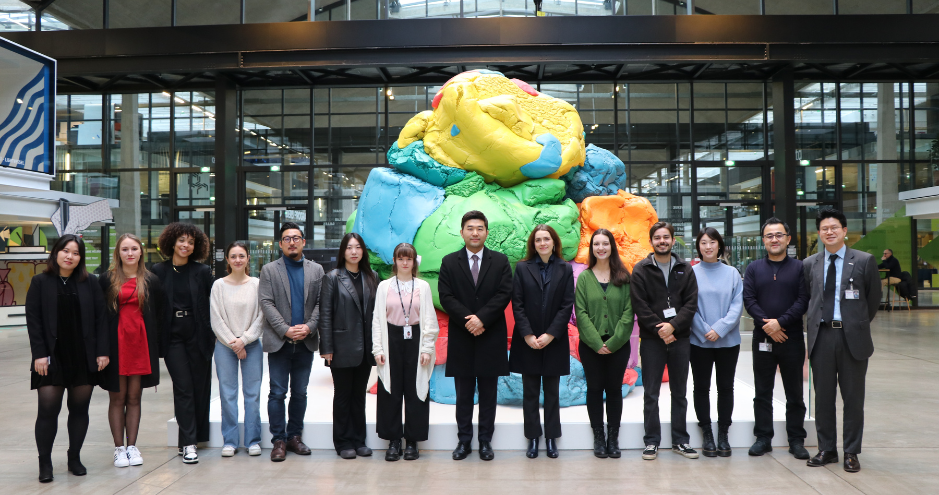
Finally, the visit of Minister Lee Young and KISED President Kim Yong-moon was a testament to the strong partnership and collaboration between Incubateur HEC Paris and the KSC programs in fostering entrepreneurship and supporting small and medium-sized enterprises.
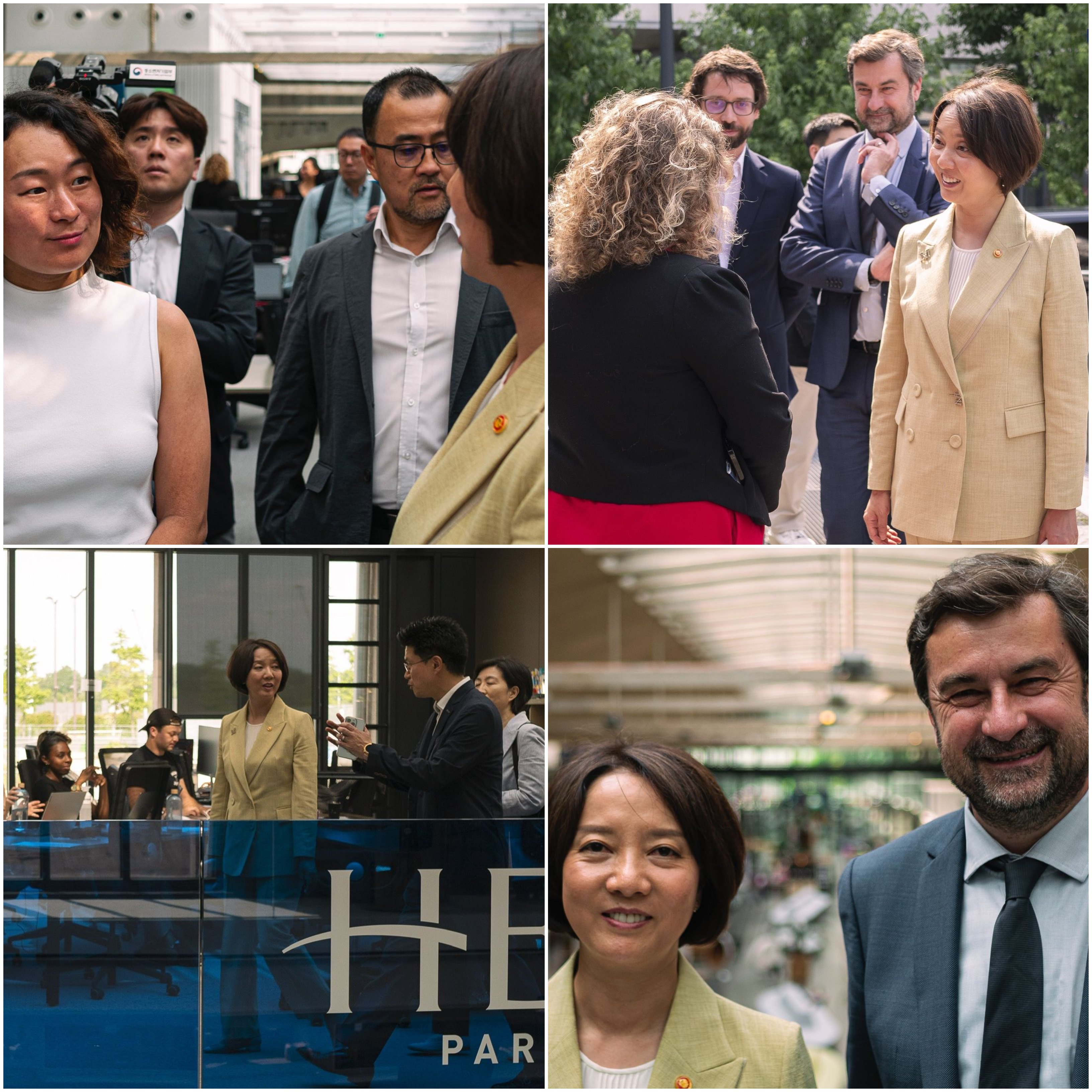
Startups from both KOSME and KISED programs
BitGlim: A new type of streaming service that decorates the interior & exterior of various spaces with digital screens and artwork.
BOTTLESS: An ecofriendly company providing innovative refillable packaging solutions for the cosemtics industry.
DABIDA: An EduTech company that has developed an AI platform to supports cloud-based interactive content and and writing-based individualized learning.
EasternGear: A company specializing in customized and cost effective gears (reducers) with optimised durability.
GEOGRID: A company that provides smart water purification solution for buildings.
Globaleur: A company that delivers AI-powered digital transformation solutions to global leaders in travel.
Ground One: An architectural design platform that uses ‘Gen AI’ algorithms to rapidly generate detailed blueprints.
Hopae: A company that provides scalable, secure, and eIDAS2-compliant Digital Identity (DID) solutions for seamless EU ID integration.
LPTech Co. Ltd.: A company that develops a teaching less and sensor less gripper (robotic finger) for assembly line robots.
LRHR: An O2O Platform utilizing AI and Big Data to find the optimal luxury product repair specialist.
NOOGI: A company that provides healthcare chairs that helps maintain a good posture in real time and relieve pain.
Pi-xcels: A company that provides physical retail stores with the customer data (similar to e-Commerce companies) through the seamless issuance of digital receipts.
Safeware: A company that produces a variety of wearable airbag products for leisure & sport activities and elderly & infant protection.
V space: A UAM manufacturing company that specializes in manufacturing high-output, high-density battery packs.
Vsion Inc.: A company that specializes in the development and production of PDLC (Polymer Dispersed Liquid Crystal) films for smart window applications.
To find out more about our programs dedicated to Korean startups, visit:
